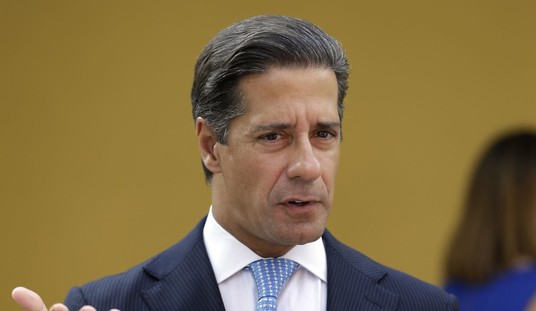Two months after Donald Trump declared victory in Syria and announced a total troop withdrawal, the White House has quietly retreated on both. Yesterday, Sarah Huckabee Sanders announced that “a small peacekeeping group” would remain in Syria, which could mean two hundred or more troops. The shift followed a rebuke from European allies on a request that they fill in the vacuum after our departure:
A U.S. official, speaking on the condition of anonymity to discuss details not yet made public, said that the 200 would be “split down the middle” between Syrian Kurdish-controlled areas in the northeast of the country, and the Tanf garrison in southeast Syria. The official said the total might rise slightly.
The decision was a partial reversal of President Trump’s order, announced in December, that all 2,000 U.S. troops in Syria would leave, since their mission to destroy the Islamic State caliphate, in his view, had been achieved. Complete withdrawal was expected by the end of April.
Defense officials, lawmakers and some White House aides have expressed concern that tens of thousands of militant fighters remained scattered throughout Syria and Iraq. France and Britain, which also have troops in Syria, rebuffed a U.S. request to leave forces there to continue operations against militant remnants and to patrol a “safe zone” along Syria’s northeastern border with Turkey unless some U.S. troops remained.
Appearing on Fox & Friends this morning, Sanders explained that Donald Trump has concerns that an outright withdrawal could destabilize the region. Two hundred troops is a “rough estimate,” the White House press secretary states, but that the recalculation was intended to ensure the safety and security of our allies. “At the end of the day, the president wants to bring our troops home,” Sanders says, “and he’s working towards that.”
This switch actually means Trump isn’t entirely working toward that, but he has good reason to rethink his December declaration. His own commander in the theater publicly disputed the claim that ISIS has been defeated as a national-security threat, and estimates of their fighter ranks run from the mid-four figures to the low-five figures. Most of their leadership remains intact, if on the run at the moment. That reality apparently began to sink into the White House over the last week or so, which led to the request to our British and French allies to stick around while we bugged out. Their response was both quick and entirely understandable:
Allies have “unanimously” told the United States that they “won’t stay if you pull out,” a senior administration official said. France and Britain are the only other countries with troops on the ground in the U.S.-led coalition battling the Islamic State.
Along with the United States, they have provided training, supplies, logistics and intelligence for the Syrian Democratic Forces, the Kurdish-dominated group that has done most of the fighting. U.S., French and British forces also operate heavy artillery and conduct the airstrikes that have been decisive against the militants.
French Foreign Minister Jean-Yves Le Drian said last week that he was mystified by Trump’s policy. On Tuesday, British Foreign Secretary Jeremy Hunt said that “there is no prospect of British forces replacing the Americans” in Syria.
European refusal to stay unless President Trump reverses at least part of his troop withdrawal order is one of several factors that U.S. military officials, lawmakers and senior administration officials have said should make Trump think again.
The big question now will be whether the “peacekeeping” force will be a large enough commitment to keep the UK and France in place. It certainly won’t be large enough for any effective “peacekeeping” mission, not in fractured and fraught Syria. Sanders’ ambiguity on the size of the force has to be intentional, giving Trump the ability to scale it up to the level needed to ensure against a complete collapse of the anti-ISIS effort.
Here’s the F&F segment with Sanders, in which she also comments on Jussie Smollett’s alleged hoax. Her oh-so-brief comments on Syria come sandwiched between discussions about Robert Mueller and Michael Cohen. You might have to make sure you don’t blink in order to keep from missing them. Sanders tells the panel that Trump tweeted his disdain for Smollett because Democrats had initially embraced him as a way to “attack and come after this president … The president is pushing back.”








Join the conversation as a VIP Member